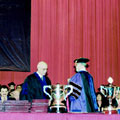|
Department of Physics
School of Sciences and Engineering
Professors: A. Aboulsaood, S. Arafa, F. Assabghy (Dean of SSE), M. Gaafar, M. Hammam, H. Omar
Associate Professors: A. El Fiqi (Chair), A. Shaarawi
Assistant Professors: M. Chis, T. Hassanein
Master of Science in Physics
The Master of Science program in physics provides, along with a deep and solid foundation in basic physics, theoretical and experimental skills that are transferable to many professions besides the traditional physics research careers. These skills, acquired within the main stream of study in theoretical and condensed matter physics, include mathematical modeling, instrumentation and experiment design, and general laboratory and research techniques.
A total of 32 credit hours is required for the Master of Science degree. This consists of 24 credit hours of courses and 8 credit hours of thesis work. In addition, all students are required to pass a written qualifying examination that should be taken after successful completion of 18 credit hours. The exam covers topics of basic physics at the level of the first year of graduate work and can not be taken more than twice.
Admission
A Bachelor's degree in physics or a related field, with a minimum GPA of 3.0 out of 4.0, is required for admission into the physics master's program. Admission is also subject to the general university requirements for the graduate program. For those students whose grade records indicate promising ability, but whom otherwise did not have the availability of an adequate preparation in physics, admission may be granted under the requirement that remedial courses will be taken.
Courses (24 credit hours)
The program of study is planned with the faculty advisor; and should include 6 credit hours of core courses, 12 credit hours chosen from the concentration courses, and 6 credit hours of physics electives.
Core Courses (6 credit hours) |




